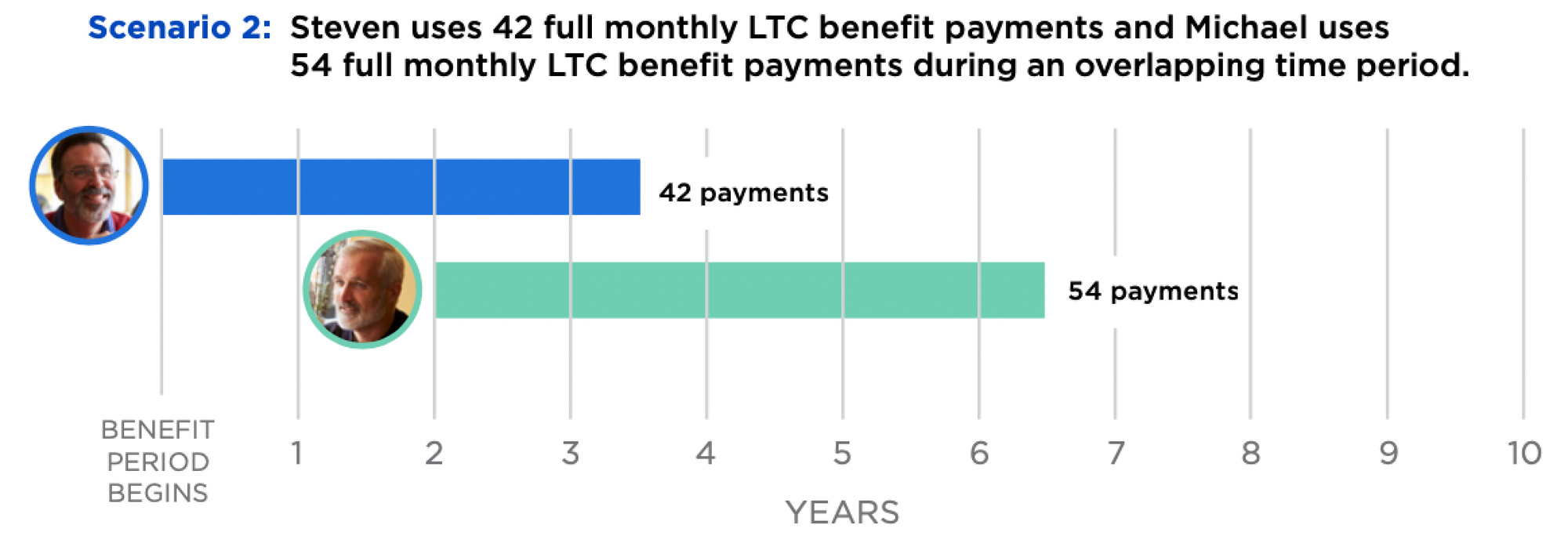Intro
CareMatters Together, a joint hybrid policy, brings groundbreaking elements to the universe of long-term care insurance:
- Joint policy: Lower costs for two people under one plan.
- Cash indemnity: Spend your benefits however you see fit.
- Greater chance of full benefits: More opportunities to get paid.
- More tax savings: Lower your overall policy costs.
- Generous elimination period: Get paid for care from day one.
If this policy were a Star Trek duo, it’d be Kirk and Spock—trailblazers boldly innovating in their field. Just like the iconic scene where they mind-meld with two humpback whales to save the future, this policy might not save the world... but it could definitely save your financial future from long-term care costs.
Here's a quick 30-second clip to set the scene:
As you consider your options, let "LTC" guide you: Learn about options, Talk with family, and Create a plan that supports your shared future.
Post jargon
benefit: the amount LTCi pays for covered care expenses
benefit period: the maximum time LTCi pays for care after criteria are met
benefit pool: total amount available in LTCi for care expenses
cash indemnity: pays the full benefit, regardless of the actual care costs
death benefit: a payout to a beneficiary from a hybrid policy after the insured passes away
elimination period: the waiting period after criteria are met before benefits start
exclusion: an insurance rule that denies benefits for specific risks
inflation protection: LTCi benefit that adjusts for rising costs
premium: the payment to maintain insurance
rider: an insurance add-on
underwriting: insurer’s review process to decide coverage and cost
➡️ Explore all the LTC jargon
Standard benefits
CareMatters Together comes with many standard benefits of a hybrid policy:
- Guaranteed premiums: Your costs can never...go...up.
- Guaranteed benefits: Your payouts always match your policy terms.
- Benefit triggers: Coverage starts when you need help with two ADLs or cognitive decline.
- Broad coverage: Includes informal care (e.g., family), home health care, adult day care, assisted living, nursing homes, memory care, CCRCs, care coordination, respite care, and hospice.
- Inflation protection (optional): Keeps your benefits aligned with rising costs.
- Death benefit: If you never use your benefits, your family receives a payout upon both policyholders' deaths.
- Money-back option: Cancel your policy anytime and get some or all of your money back.
What's special about CareMatters Together?
In a competitive market, policies often include standout features to set themselves apart. Let’s take a closer look at what makes CareMatters Together special.
Joint policy
Two people share a single policy and pool their benefits, even if they aren't married, at a lower cost than two individual policies.
For example, for a policy with 8 years of benefits (96 months), both people can share the total in any combination they choose.

Other benefits of a joint policy include:
- Increased LTC coverage: A larger portion of the benefits is allocated to LTCi compared to life insurance.
- Lower overall cost: Joint policies are more affordable than purchasing two separate policies for LTCi benefits.
But a joint policy has a few drawbacks compared to two individual policies:
- Limited coverage: If one person uses the full policy benefit, there’s nothing left for the other person.
- Delayed death benefit: Unlike individual policies, where the surviving partner receives the death benefit when the first partner passes, joint policies delay the death benefit payout until both partners have passed.
Cash indemnity
This policy offers cash indemnity payouts, providing higher payouts and greater flexibility compared to traditional reimbursement-based policies.
- No need to submit receipts – less paperwork, less hassle.
- Full, maximum benefit – paid each month, regardless of actual care costs.
- Freedom to spend on any type of care – including payments to family caregivers, with fewer exclusions and no approvals required.
Check out this 2-minute feel-good video from Nationwide on how cash indemnity offers you the freedom to receive care at home.
Greater chance of full benefits
CareMatters Together offers a greater chance of getting your full LTC benefit pool compared to two individual policies.
Get. Those. Benefits.

Here’s why: With two separate 4-year policies, each person needs 4+ years of care to utilize their full benefits. But with an 8-year joint policy, benefits can be shared in any combination—like 2 years for one person and 6 for the other—creating many more ways to use your coverage to the fullest.
More tax savings
In many cases, you can deduct the LTCi portion of your premium, but not the life insurance portion. Nationwide policies separate these premiums, allowing you to take this deduction.
CareMatters Together also dedicates more of the premium to LTCi than CareMatters II (the individual policy), giving you greater potential savings through tax deductions.
Generous elimination period
An elimination period, or waiting period, is the time after qualifying for benefits when you cover costs out of pocket before the policy kicks in.
Here’s why this policy stands out: each partner has their own 90-day waiting period, but the generous feature is this—after 90 days, you're retroactively reimbursed for those expenses.

Video break
Check out this 3-minute feel-good video from Nationwide about CareMatters Together. It touches on many of the topics discussed in this post so far.
The details
If this policy sounds intriguing, let’s dive deeper.

We rate each policy’s benefits, premiums, underwriting, and company on a three-star scale, with three stars being the best.
Benefits
Benefits are what the policy pays for covered care expenses.
CareMatters Together combines key hybrid policy benefits: cash indemnity, minimal exclusions, a death benefit, plus a substantial benefit pool in a joint policy for two people.
Premium
Premiums are the payments made to maintain insurance coverage.
CareMatters Together offers a cost-effective way to cover two people, offering several premium options.
Underwriting
Underwriting is how an insurance company evaluates your health and history to determine coverage and pricing.
Nationwide CareMatters Together sorts applicants into two health categories, which determine your rates. The top tier, Preferred, requires excellent health.
Company
Choose a top-rated insurer for reliable LTC coverage. We work only with financially strong companies to ensure they’ll be there when it counts.
Nationwide's experience and ratings are average compared to the other policies we offer.
Comparisons
How does CareMatters Together compare with other LTCi policies? Focus on what matters most to you to make the best policy choice.
Benefits
In this table, you can compare the benefits of all the LTCi policies we offer. You can:
- Search for any detail.
- Tap any column title to sort.
- Scroll right to view more columns. ➡️
Next steps
If this policy seems like a good fit, click the link below and include 'CareMatters Together II' in the notes section at the final step.
Wrap up
In a world of individual policies, CareMatters Together is the 'Kirk and Spock' of LTC insurance—stronger as a team, bringing innovation to joint coverage.
This policy is ideal if you want:
- cash indemnity benefits similar to CareMatters II
- coverage for two people at a lower cost
- tax advantages, especially for small business owners
- the highest chance of using your benefits
However, qualifying for the preferred class isn’t easy. Both partners must be in good health with minimal medical issues or prescriptions. If not, two individual CareMatters II policies might offer better value.
Request a quote, and we’ll compare both plans to help you choose the best option.








